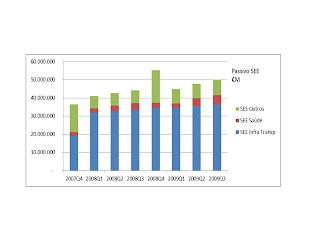Banks taking on EFSF-guaranteed bonds seems to be another way of laying off risk to the public sector.
1. Private sector banks fed the debt crisis by their lax lending cross-border to weaker Euro borrowers (the Euro version of the "subprime" mess).
2. Public sector creditors have "nationalized" much of this excess debt exposure through various ECB/EFSF and other public sector facilities, underwritten by taxpayers
3. Private sector creditors have nevertheless suffered losses with rising yields, as repricing of the risk continues
4. Private sector creditors are willing to keep lending, but only with higher yields and/or formal public sector guarantees...
Combining high yields with low (guaranteed) risks may repeat, ex post, the ex ante financial imprudence (see point 1). Just one more CDS, except this one would have to pay out.
Instead, KISS - keep it simple. Let each creditor name his price without doubling up with guarantors which only use up risk assumption capacity. Public sector creditor intervention should be focused on stabilizing the credit market, on promoting longer maturities and other concessionary conditions, for debt refinancings as well as new money debt, and insuring financial discipline and prudence, on the side of the creditors as well as on the borrowers.
Most of all, public sector credit intervention should focus on reorienting credit to the economy, especially to the export sector which is truly starved.
Note that Europe does not even have an Export-Import bank...







